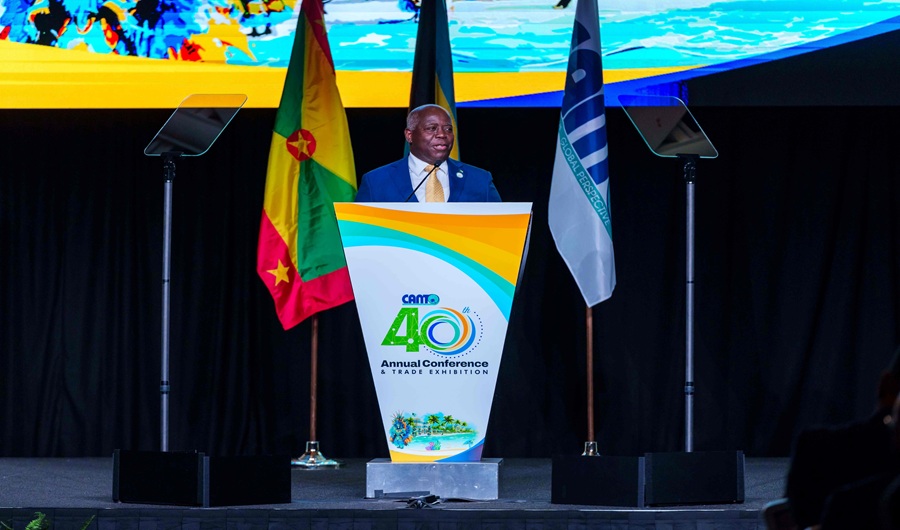Bahamas PM: Digital Transformation Must Empower Our People, Not Just Our Networks
Addressing delegates at the opening of CANTO’s 40th Annual Conference and Trade Exhibition, Prime Minister the Honourable Philip “Brave” Davis of the Commonwealth of The Bahamas delivered a pointed and purposeful message: digital transformation must prioritize people over platforms, equity over optics, and sovereignty over dependency.
Speaking before more than 700 CANTO delegates from 52 countries gathered at the Grand Hyatt Baha Mar, Davis positioned The Bahamas not only as a host but as a regional leader with a clear national digital agenda. He used the platform to call for a Caribbean approach to technology grounded in inclusion, resilience, and long-term value creation.
Introduced by Wayde Watson, Member of Parliament and Parliamentary Secretary in the Ministry of Economic Affairs, The Bahamas, Prime Minister Davis was described as a regional statesman with a legacy of people-centered leadership. In his address, Davis outlined his administration’s commitment to digital equity and national resilience as central pillars of its broader development vision.
“Digital transformation must be about more than systems and speed. It must improve lives, create opportunity, and expand access to justice, education, and entrepreneurship,” Davis said.
Framing his remarks around the conference theme, “Towards a Unified and Sustainable Caribbean Gigabit Society” Davis stressed that the region must not fall into a new era of digital dependency. He underscored that Caribbean nations must craft their own frameworks for digital development, ensuring local needs and identities remain central.
“If we are not careful, we may unwittingly exchange one form of colonialism for another, this time in the form of digital dependence. We must ensure that the digital era empowers us rather than enslaves us,” Davis warned.
He emphasized that technology must serve local development priorities rather than simply mirror global trends.
“What we build must be resilient, yes. But it must also be inclusive. A truly digital society leaves no one behind, not the child in the Family Islands, not the elderly, not the small business owner without formal banking access,” he said.
Davis’s government has recently advanced several digital initiatives aimed at improving access and service delivery. These include the expansion of free Wi-Fi zones in Family Island communities, the digitization of key public services such as passport renewals and business licensing, and ICT-focused training for youth and entrepreneurs under the “MyGateway” and “TechEdge” initiatives.
Referencing The Bahamas’ 51st Independence anniversary, Davis reminded delegates of the country’s legacy of leadership, noting it was the first Caribbean nation visited by Nelson Mandela following his release from prison. “Just as we stood on the right side of history then, we must do so again, this time in the digital fight for equity, resilience, and inclusion,” he said. The statement underscored his call for Caribbean nations to lead with principle and unity as they shape their digital futures.
The Prime Minister also underscored the importance of technological sovereignty planning, warning against over-reliance on external systems or vendors.
“The tools may be global, but the solutions must be national. We must use this digital tide to lift our people, all our people and ensure that our data, our systems, and our future remain in Caribbean hands.”
The Prime Minister urged deeper CARICOM coordination on issues such as data protection, cybersecurity, and regulatory harmonization, highlighting that small island states share similar vulnerabilities and opportunities.
“This is not just about access to technology. It is about access to dignity, to opportunity, and to global competitiveness.”
He further acknowledged The Bahamas’ legacy as both a founding member of CANTO and the most frequent host of its annual conference, while positioning that legacy as a call to leadership rather than a resting point.
“In the Caribbean, we do not wait to be shaped by technology. We shape it to reflect who we are, and who we aspire to be.”
As the Caribbean advances toward a more connected and equitable future, Prime Minister Davis’s message stood out not only for its national grounding but for its regional relevance. His call for digital independence, inclusion, and human-centered progress adds a necessary voice to the conversation, one that challenges the region to shape technology on its own terms, for its own people.




